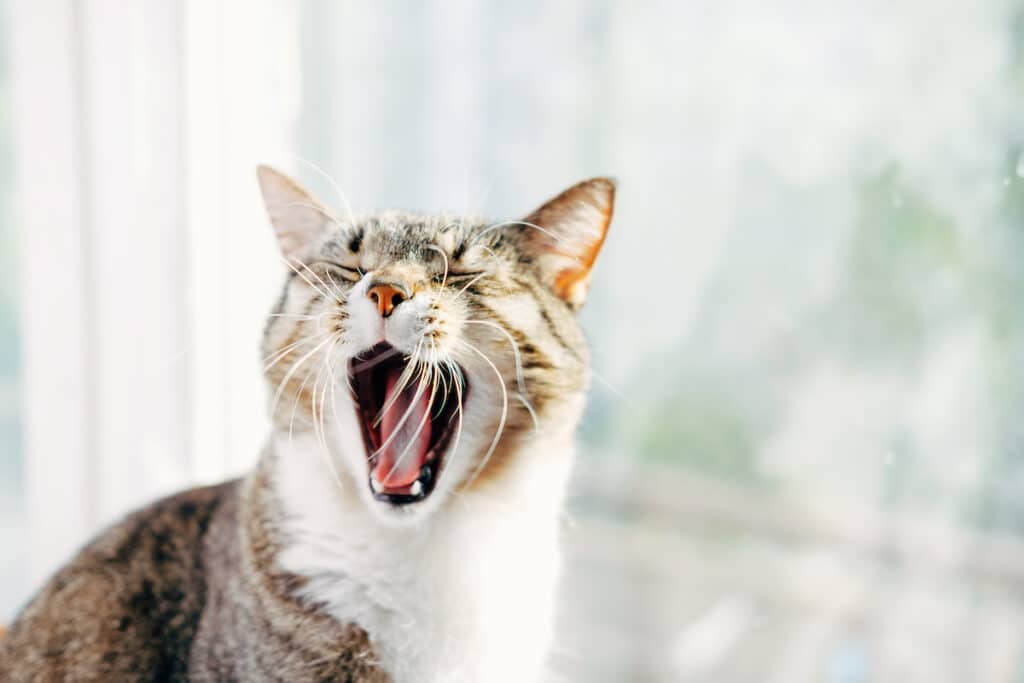Whether or not you do cats yawn, there are some basic things you should know about their behavior. These are signs of relaxation and stress, and they can indicate unease as well.
Involuntary behavior
Yawning is a common involuntary behavior in cats. It occurs when the body is hot and is thought to be a mechanism to cool the brain. The yawning process involves a wide mouth opening, a slow and deep inhalation, and a long and leisurely expiration.
This involuntary behavior in cats may be a form of communication with other cats. It may also indicate that the cat is uneasy about a new smell, a stranger in the home, or a disruption in the routine. It may also be a courtesy to an owner.
Excessive yawning may be a sign of dental or mouth disease. This may cause foul breath and difficulty swallowing. It may also be a sign of an oral infection.
Some cats may yawn to deescalate a conflict with another cat. They may also yawn to keep the attention of their owners. They may also yawn when they are uncomfortable.
Some cats will stretch out in front of their owners to try and catch their attention. This can be a way to let them know they are safe and comfortable.
Signs of stress
Yawning in cats is a calming and relaxing occurrence. Yawning also helps in bringing more oxygen to the brain. If you notice your cat yawning a lot, it could be a sign of a medical condition or stress. Keeping your cat healthy is important, and looking out for signs of discomfort is a must.
Cats yawn to relax, prepare for sleep, and communicate. They yawn to let other cats know they are not a threat. They may also yawn when they’re bored or uneasy.
It’s often hard to tell if your cat is feeling stressed or not. If you notice that your cat is yawning a lot, or if they are panting, then it’s likely they are stressed. There are also several other signs of stress in cats. The best thing to do is to keep an eye out for signs of stress in your cat, and try to correct it if it is a real problem.
One of the most common signs of stress in cats is the hypervigilant scanning of the room. This is probably caused by anxiety. If your cat is displaying this behaviour, it’s best not to interact with them until they’re calm.
Signs of relaxation
Yawning in cats is a common involuntary behavior. It is a quick and obvious way to take in more oxygen. Cats yawn when they are tired or bored. They may also yawn in order to communicate with other cats. They will also yawn to get attention.
Although there is no clear answer to the question, “Do cats yawn?”, scientists have come up with a number of theories about the origins of the practice. Some theories imply that yawning is a form of communication, while others point to its role as a stress signal.
Cats yawn when they want to stretch their neck and jaw muscles. They will also yawn when they want to take a deep breath. This helps them get ready for sleep or wake up quickly.
While yawning may be the cat’s version of the ol’ meow, it is not as long lasting as the human version. In fact, cats rarely yawn when they are very tired.
Cats also yawn to signal that they are not a threat or to get other cats’ attention. They may also do so to avoid conflict.
Signs of unease
Yawning in cats is a natural, involuntary reaction. It helps increase blood flow to the brain to help cool the body’s temperature and keep the cat alert. It also helps the cat to relax.
Excessive yawning in cats may be caused by a number of different problems, such as dental pain, a dental problem, or an underlying medical condition. Other signs that your cat may be uneasy are if they lose appetite, if they seem to be displeased with something, or if they are unable to find the litter box.
Cats yawn to communicate, either with other cats or with humans. Sometimes, it is a way for cats to de-escalate aggression with other cats. It is also a way for them to express a desire for space. They may also be communicating contentment, boredom, or desire for attention.
Cats are excellent at interpreting body language. They can pick up subtle signals that humans don’t notice. You can learn how to read your cat’s body language to help them feel better.














